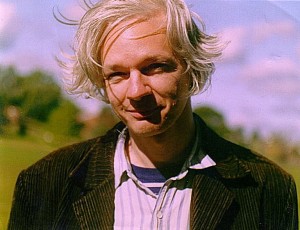

WIKILEAKS founder Julian Assange has announced he expects to leave the Ecuadorian embassy, either into the hands of British police or as a free man.
Later in this report: interviews with Australian lawyers and politicians about Assange’s lack of support at home, and a word from the WikiLeaks founder himself. Image: Assange at the embassy, by Snapperjack.
Assange was granted refuge in the embassy over three years ago after extradition to Sweden over police-fabricated sexual assault claims became a serious possibility. He has not been charged and is not wanted for trial, but British authorities placed him under house arrest. It has long been suggested Sweden or the United Kingdom would extradite Assange to the United States, which wants him to face a super-secretive grand jury over WikiLeaks’ publication of leaked classified material showing US war crimes. Neither Sweden or the UK have denied extradition is a possibility.
In a statement published on WikiLeaks’ Twitter account today, Assange said:
“Should the UN [Working Group on Arbitrary Detention (WGAD)] announce tomorrow that I have lost my case against the United Kingdom and Sweden I shall exit the embassy at noon on Friday to accept arrest by British police as there is no meaningful prospect of further appeal. However, should I prevail and the state parties be found to have acted unlawfully, I expect the immediate return of my passport and the termination of further attempts to arrest me.”
In other words: Assange plans to leave the embassy tomorrow, no matter the outcome.
Want more like this? Subscribe via Facebook and Twitter.
Another statement, published at justice4assange.com, states compensation will be sought if his detention is found to be unlawful:

Assange in 2006. Photo by Marina Harris, released to public domain.
“If [the WGAD] finds that the detention is unlawful, the WGAD will order that he be released immediately and compensated.”
The WGAD will determine whether Assange has been detained, and if so, if he has been detained unlawfully. If you have not heard of the investigation before there is a good reason: the WGAD operates in secret in the name of objectivity.
In 2007, a WGAD investigation found now-free Myanmar democracy supporter Aung San Suu Kyi’s house arrest was illegal.
You can find out more about the case from the Assange camp’s perspective by clicking here. A timeline of events is here.
What of Australia’s role in the case? Assange is Australian and some information leaked by Wikileaks affected Australia, but the Gillard Labor government did little to support him. In fact Julia Gillard, a former lawyer, described Assange as a criminal despite not being able to name any Australian laws he could have broken.
Her former colleague Peter Gordon told me in February 2011 Assange had not violated any Australian laws by publishing leaked information as he was the publisher, not the leaker.
Gordon’s comment was made at the Wikileaks and Free Speech public forum in Melbourne. There were several speakers, including Assange’s local member, Greens MP Adam Bandt. After the event, Bandt told me WikiLeaks was “guilty of nothing more than embarrassing a government by releasing information that people actually want to hear.”
Then-president of Liberty Victoria Professor Spencer Zifcak was a host of the forum. He described Assange’s arrest as “the most tremendous free speech issue of our time” and said the director of WikiLeaks had broken no laws anywhere.
Want more like this? Subscribe via Facebook and Twitter.
After the event, Zifack told me Assange was under attack at home and abroad.

Spencer Zifcak. Image: Liberty Victoria.
“Julian Assange at the moment is under the threat, particularly from the United States and to a lesser extent… Australia, of prosecution for certain criminal offences,” he said.
“Those offences have not been identified, but my message to him would be to not back down in the face of threats which, in the end, I as a lawyer believe have no substance.”
What comes out of the secret UN decision making process will make major headlines, and there will undoubtedly be protests and claims of corruption if Assange’s arrest is determined to be lawful. In a statement to the Liberty Victoria event, Assange said the US had been attempting to influence the global governance body.
“It is surely a matter of interest that the US Secretary of State, Hillary Clinton, has been running a secret intelligence campaign directed at the leadership of the United Nations, demanding passwords, DNA, total encryption keys, credit card numbers, and so on,” Assange said.
“That targeting is illegal.”
Something for US Democrats to remember during the primaries.

More like this:
After all the fuss – or lack thereof – over the last few days, Radiohead finally dropped Burn The Witch an hour ago.
It seems Radiohead forgot about Google+ when deleting everything it has ever posted on the internet – the band’s one upload remains!
THE FAT cat has long been a derisive representation the über-wealthy and greedy, and a new exhibition will put that food-shovelling image front and centre.
A drunken (allegedly) evening after a fan convention led to the conception of this year’s “copied” comic April Fools’ Day prank, which saw seemingly every webcomic artist create the exact same cartoon and then claim ownership.
It is difficult for a cartoonist to make an April Fools’ Day joke stand out; almost every strip releases at least one, and isn’t making fools of people what most comics do every day? This year however, something truly special has happened.
THERE is a light at the end of the tunnel for frustrated V/Line commuters with confirmation a further 43 rail services will be restored later this month.